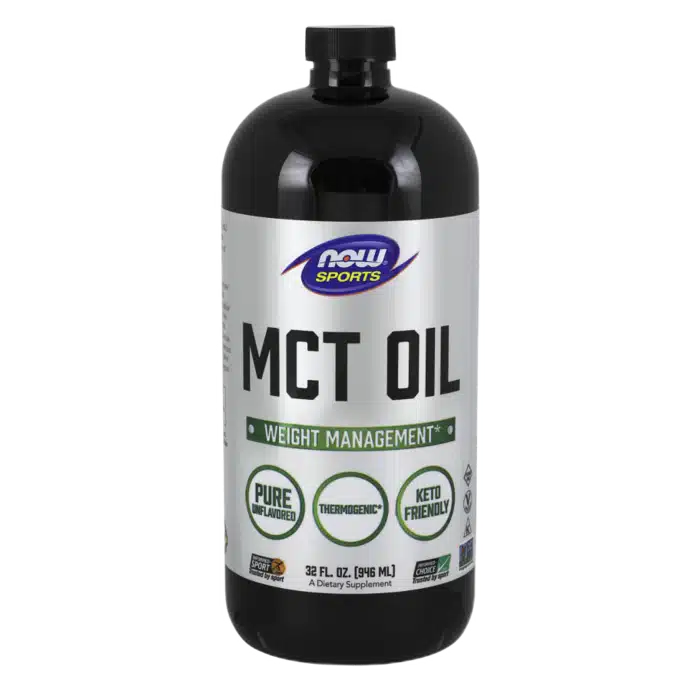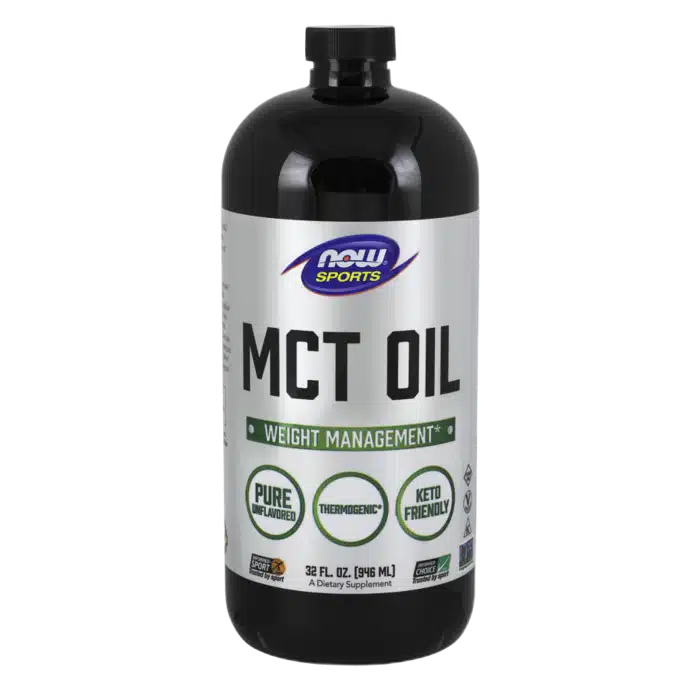MCT Oil 946ml - Now
MCT Oil 946ml - Now is backordered and will ship as soon as it is back in stock.
Description
Description
MCT Oil 946ml Now
Medium-chain triglycerides (MCTs) are fats found naturally in coconut and palm oil. MCTs are more easily and quickly digested than other types of fats, as they require fewer enzymes and bile acids for intestinal absorption. MCTs are metabolized very quickly in the liver and promote greater energy expenditure and reduced fat storage. Numerous studies suggest that replacing MCT oil with other fats in a healthy diet may therefore help support a healthy weight and body composition. MCT is short for medium-chain triglyceride. The fats we consume daily in our diet are in the form of triglycerides, whose length is determined by the number of carbons in their chains, which can vary between 2 and 22. Most of the triglycerides we ingest are long-chain triglycerides (LCTs), meaning they have more than 12 carbons, while medium-chain triglycerides are found in the range of 8 to 12 carbons. The difference compared to other fats is that MCTs have 8.3 kcal/g, a 10% lower caloric value than LCTs, which have 9 kcal/g. They are a quick source of energy because they are not incorporated into lipoproteins. Because they are more water-soluble, they do not require bile—they are hydrolyzed by pancreatic lipase, and their absorption in the duodenum is faster than LCTs. At a rate comparable to that of glucose, they enter the bloodstream and are transported directly to the liver and muscles, where they are used as an immediate source of energy. In terms of benefits, there are several indications of improved physical endurance through the consumption of MCTs. Studies indicate that their consumption increases levels of key enzymes in the Krebs cycle (the body's main energy mechanism), in addition to increasing the rate of body fat metabolism, making cellular energy production more efficient.
The use of lipids in high-intensity exercises is essential, as they are stored in the body in the form of triglycerides, in plasma, adipose tissue and skeletal muscle, reaching 60 times greater than glycogen, providing a much longer-lasting supply of energy.
However, fat slows gastric emptying, making it a slow-acting energy source. Due to the high energy demands of high-intensity athletes, MCTs are widely used in performance-enhancing strategies. Another important characteristic is that MCTs can easily cross the mitochondrial membrane without the presence of L-carnitine, which is essential for the transport of LCTs. This characteristic makes energy availability faster and suggests that MCT supplementation during exercise is a strategy to increase the availability of free fatty acids and spare glycogen. Medium-chain triglycerides may have an anti-catabolic effect due to their easy energy conversion, sparing muscle mass from tissue loss during the conversion of amino acids into calories, as occurs with carbohydrates. Because they can prevent or reduce muscle catabolism, they enable an increase in resting metabolic rate, with greater fat mobilization. The main sources of MCTs found in nature are:
Coconut oil: Lauric acid makes up approximately 50% of coconut fat. Other lipid sources in coconut include caprylic acid, which has antioxidant properties and is a source of medium-chain triglycerides (MCTs).
Palm oil: Also known as palm oil, it contains equal proportions of saturated fatty acids (palmitic 44% and stearic 4%) and unsaturated fatty acids (oleic 40% and linoleic 10%). It is a natural source of vitamin E, tocopherols, and tocotrienols, which act as antioxidants. It is also rich in beta-carotene, an important source of vitamin A.
946 ml



